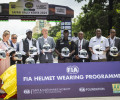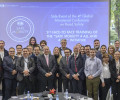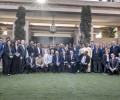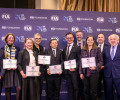LEADING A GLOBAL MOVEMENT: THE WORLD COUNCIL FOR AUTOMOBILE MOBILITY DRIVES PROGRESS AND INNOVATION FOR FIA MEMBERS AND ROAD USERS
During its last meeting of the year, the World Council for Automobile Mobility and Tourism reviewed the progress achieved in advancing the mobility agenda with and for the FIA Members.
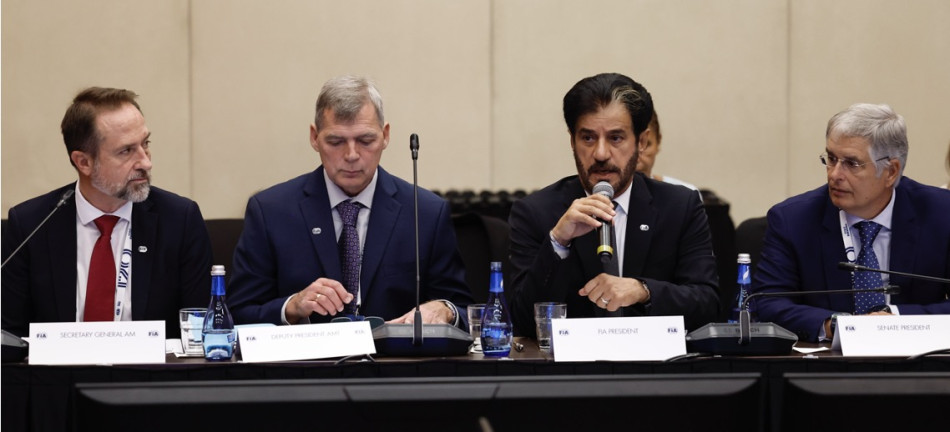
FIA President Mohammed Ben Sulayem opened the meeting by thanking the Rwanda Automobile Club for hosting the World Council and emphasised the crucial importance for FIA Members to gather as a global community to drive forward a shared vision for mobility. He then highlighted the advancements of 2024. “Together we have made great progress towards making the FIA the global voice for safe, sustainable and affordable mobility. I am proud of what we have accomplished and I'm excited for the journey ahead of us. Looking to 2025, we aim to build on our successes with even greater ambition,” he said.
Also addressing the World Council, the FIA Deputy President for Automobile Mobility and Tourism Tim Shearman underlined the key achievements of the four FIA Mobility regional offices, celebrating their exceptional commitment, and emphasised the importance of their collaboration with the global office in driving the success of the FIA Mobility's initiatives.
The World Council then heard about the new FIA Secretary General for Automobile Mobility Willem Groenewald’s vision for 2025. Building on his experience, Willem highlighted his plan to bring the FIA Member Clubs’ perspective to the forefront and shape a new movement for the FIA Mobility — one that not only champions global mobility but also provides FIA Clubs with vital development tools to ensure their success and growth.
The agenda of the meeting comprised the presentation of the work plans of the FIA Mobility Services Commission and FIA Mobility Policy Commission for 2025 and the review of achievements made in 2024 to drive a safer, more sustainable and accessible mobility future through strong regional cooperation and Member empowerment.
The World Council members praised the success of the first edition of the FIA Innovation Challenge which received 44 applications from Member Clubs from the four FIA Mobility Regions and acknowledged the key role of this new initiative in fostering business innovation across the network.
Forward-looking approaches were also at the heart of the FIA University developments this year with the success of new programmes — including the first FIA University Mobility Immersion Programme — and the renewal of more established global programmes — such as the FIA University Senior Executives Programme developed in partnership with Columbia Business School in New York City. Additionally, innovative initiatives like training with the Drone & Vertical Mobility Academy were highlighted as examples of the FIA University’s efforts to equip Members with cutting-edge skills and knowledge on how the world will move tomorrow. With the new Safe Mobility 4 All & 4 Life programme — designed in collaboration with UNITAR and supported by the FIA President’s Development Fund and FIA Foundation — FIA Region III and IV Clubs have begun training to enhance their road safety knowledge and advocacy skills. World Council members noted the FIA University’s goal of constantly adapting and developing impactful content to better meet FIA Clubs’ needs, ensuring they stay at the vanguard of mobility advancements.
World Council members heard about the latest developments in the FIA-led One Road global loyalty programme. The programme continued its expansion in 2024, onboarding new Clubs and partners and enhancing services to improve user experience and streamline access to exclusive benefits for FIA Clubs’ members.
Advocacy work also took centre stage during the meeting, with a report on the Global Road Safety Programmes and, more specifically, on the FIA Road Safety Index’s pivotal role in shaping a safer future for all on the roads. The Index further attracted global attention this year, with more companies starting to apply the methodology and the concept of traffic safety footprint being recognised as a critical factor to assess the social responsibility of organisations worldwide.
The next Global Ministerial Conference on Road Safety — that will be held in Marrakesh in February 2025 — will be an occasion to showcase the transformative power of the Index and bring together FIA Clubs to highlight the work they are carrying out on the ground to save lives on the road every day.
The FIA Safe and Sustainable Mobility Grants Programme supports many of these initiatives and the World Council members welcomed the continuous development of new funding opportunities for FIA Members and Mobility Regions, with the goal of helping them deliver meaningful projects aligning with the FIA’s strategic objectives.
Sustainability was also at the heart of the FIA Mobility’s agenda, especially with the FIA Smart Driving Challenge which, in 2024, continued to give drivers from all over the world the chance to upskill their behaviour at the wheel and reduce the environmental impact of their everyday driving.
Also strongly committed to drive positive change for a more sustainable future, FIA Chief Development Officer Habib Turki addressed the World Council members to present the strategic objectives of his cross-pillar department, including plans to support business expansion for the benefits of FIA Members, and highlight the successes achieved in 2024 within Tourism Services. Among them was the signing of a Memorandum of Understanding with UN Tourism and the appointment of FIA President Mohammed Ben Sulayem as UN Tourism’s Ambassador for Sustainable Tourism. The focus was also on facilitating cross border with active work carried out within UNECE Working Parties 1 and 30 to modernise and digitise the Carnets de Passages en Douane (CPDs) and the International Driving Permits.
World Council members concluded by reaffirming their commitment to delivering meaningful change and ensuring a sustainable future for all road users by working with and for the FIA Members.

 Facebook
Facebook Twitter
Twitter
